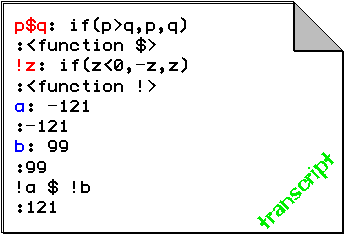Functions with names consisting of the
following characters:
are called operators. They can
be used to define, apply or assign functions. For instance:
!(z): if(z<0,-z,z)
define perfectly valid functions that can be used in the regular way:
resulting in maximum value of the
absolute values of a
and b.
It would however be much more convenient to use standard operator
notation:
Pico supports operator notation as a (non essential) extension of its syntax:

Calculus teaches us that infix and
prefix notation involving operators requires precedence rules and a
means to change these rules by using parentheses. We refer to the
next chapter for a strict definition of these rules. For the moment,
it is sufficient to use an intuitive approach to operators and their
relative precedence.